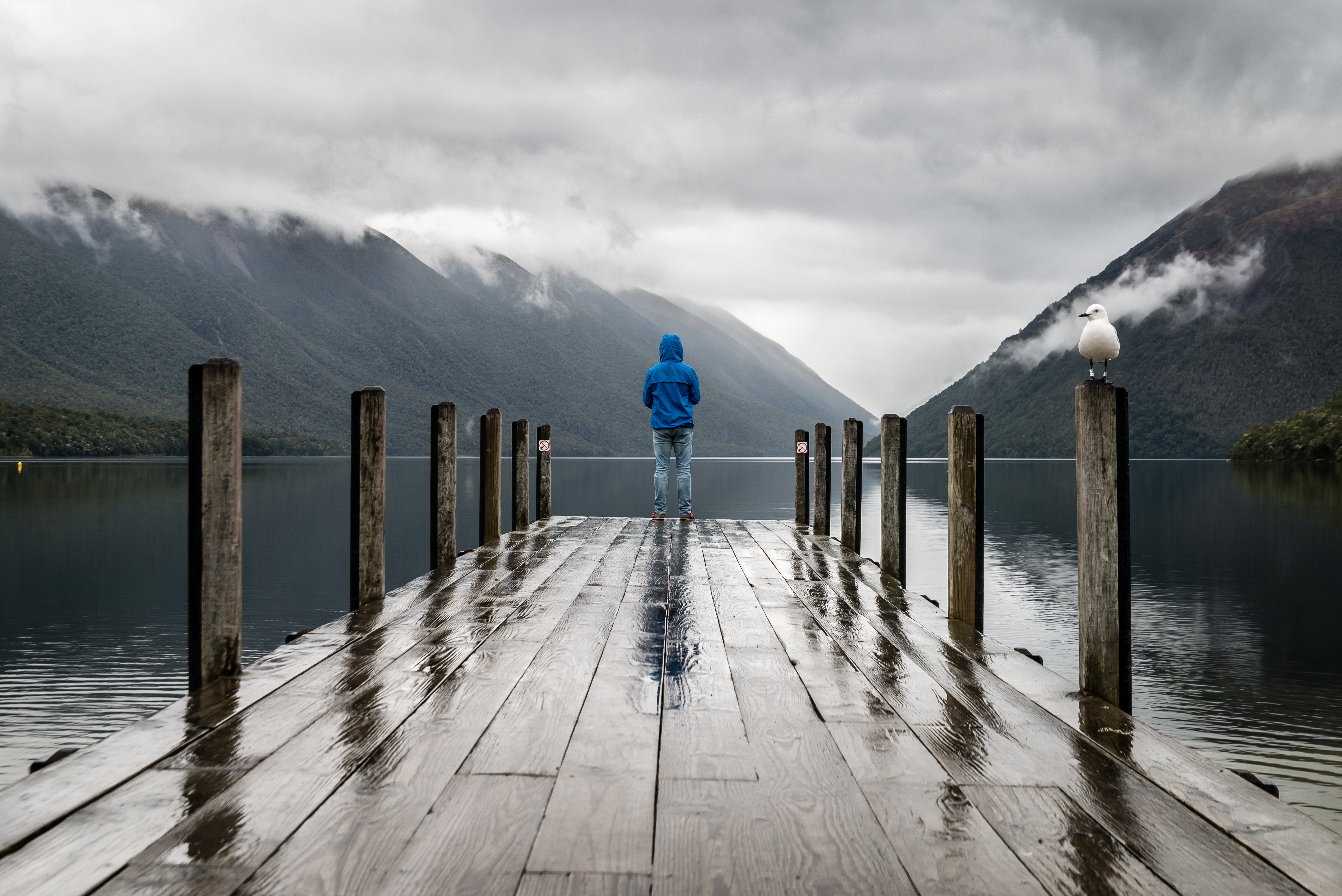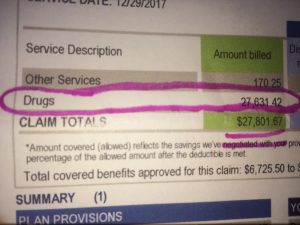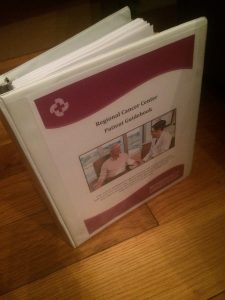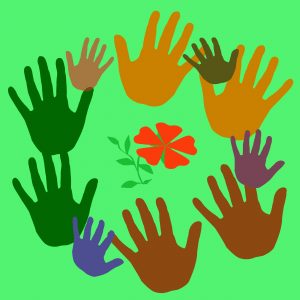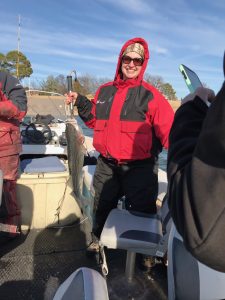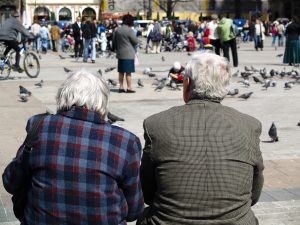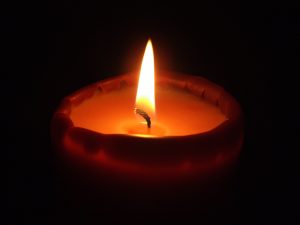Long-Winded, Serious Stuff Ahead, Be Warned, Read At Your Own Risk
I haven’t written a blog post in a while, mostly because I haven’t written much of anything in a while. You see, my husband was diagnosed with terminal cancer fall 2017 and my life went from complaining about Illinois drivers and never-ending laundry piles to OHMYGODWHATTHEFUCKJUSTHAPPENED?!?!?!?!?!?!?!?!?
First I didn’t have time to write since I was the designated chauffeur for doctor appointments and chemotherapy treatments and eventually I became a round-the-clock nurse. After my husband passed away in March, and summer finally put time into my hands, my emotion-laden brain prevented any creative work. I came to think that if I took up those activities that brought me personal joy: writing, singing. . . writing, I’d have to become vulnerable and tap into areas of my heart that I’d blocked off. It’s hard to write through a torrent of tears. Plus I thought the blockades would come down on their own once I “got over” my grief. Then I felt guilty for wanting to do these activities when I still felt so awful. Then I felt guilty for not doing these activities when I knew they’d help me feel better. What can I say, I’m messed up.
Well, I haven’t gotten over anything yet, but in an effort to shed guilt and process my grief, today I write a little bit (pretend the words “little bit” are typed using the sarcastic font) about what it was like to spend the last four months of my husband’s life with him. Maybe some of the things I share will help someone else. I know when we received the shocking news: TERMINAL CANCER, I was desperate for information and I scoured the internet for first-hand experiences, reading every blog, article, and post Google could find for me.
*The internet loves a numbered list, so I’ve tried to categorize down some of the things I learned to ten main things, although you’re sure to realize there’s not a finite amount of learning to be had. . .
The #1 thing I learned: THERE WILL BE GUILT
My husband smoked a pack of cigarettes a day on and off for 30+ years and he drank heavily for 45+ years. When he received his cancer diagnosis he immediately stopped smoking AND stopped drinking. Fear is a great motivator. Doctors assumed that his aggressive small cell cancer MUST HAVE started in his lungs before metastasizing to his liver (the lungs are where small cell cancer usually starts). However, x-rays and CT scans proved otherwise. His lungs were clear. Some of the places where the cancer could have started included skin, bladder, prostate, colon, and pancreas. It definitely didn’t start in his lungs, brain (he had a head MRI) or liver, but once it moved to his liver: game over.
We never did find out where the cancer originated, as the biopsy from his liver was inconclusive. The pathologist recognized small cell, but not what type. But everyone knew the chemicals he’d inhaled and the alcohol he’d consumed over the years had to play some part in screwing up his cells and he felt guilty about that. He also felt guilt about his “I’m invincible” attitude, which had translated into a colonoscopy he never got, moles he never got checked out, a diet where chili cheese fries were a main staple, and an exercise regimen of mowing the lawn once or twice a season. It didn’t help that he’d worked at nuclear power plants for most of his 35 year career or that cancer runs in his family.
His guilt was my guilt too. During our marriage I nagged like a good wife, but mostly I was “NOT YOUR MOTHER” when I could’ve, should’ve, would’ve made those annual physical appointments for him and drove him to ensure he went. As it was, he didn’t even have a primary care physician in a town we’d lived in for nearly eighteen years.
The lifestyle guilt was only the beginning. He felt guilt over the prospect of leaving his family, especially his not-yet-completely-raised teen daughters. There was guilt about the trips he postponed and then cancelled, the work projects left undone, and his not having the energy to take the garbage out any more. He felt guilt about the bills he was going to leave behind, and that he never got around to flushing the hard water deposits out of the humidifier.
I felt guilty about leaving work at a moments notice to attend to his needs, constantly pulling our girls out of school, not making time to have a real conversation with our 22-year-old son, backing out of commitment after commitment, resenting the fact that cancer was steeling my life too, and then of course, I’d feel guilty about feeling guilty.
The worst guilt of all was that I didn’t want to let him go, even when he was suffering, and he suffered longer because of it.
We both hung on to our guilt until the very end. But on March 18, 2018 we let it go, together, when I told him it was okay that he leave us, that we would be okay, and his last words were “okay, I’m going to go now.”
#2 ARGUMENTS STILL HAPPEN, BUT THEY’RE DIFFERENT NOW
Throughout our marriage, my husband and I argued about almost everything. From where to go out to eat to how to discipline the kids to why sticking the satellite dish in the front yard near the road was not a good idea. It was kind of our schtick. Opposites attract? Absolutely, but they also argue. He threw away his 2016 vote on Gary Johnson for Pete’s sake; how could I NOT argue with him?
Although it wasn’t necessarily good for our kids to hear us fighting, we did show them that people who love each other can disagree with each other and still love each other. Our arguments were never physical but did involve button-pushing, creative cursing, and gender insults, but they also led to eventual apologies.
Until he got cancer.
The first month after his diagnosis we didn’t fight at all. We were eerily quiet with each other, sometimes just staring at one another. Then chemo happened, and he was miserable and scared and grumpy and I was tired and scared and grumpy. Our arguments inevitably returned, except they were different now, becoming very short and very intense. They went something like this:
ME: “I know you don’t feel well, but don’t take it out on the kids.”
HIM: “I’m sorry.”
ME: “I know.”
or something like:
HIM: “You’re taking the long way again. Just get on 20. Why do you have to drive like that?! Turn here, turn there, turn back there.”
ME: “I know my way home. You’re being an asshole.”
HIM: “I’m sorry.”
ME: “I know.”
#3 HEALTH CARE IS FILLED WITH BUREAUCRATIC DELAYS AND THE COSTS ARE INSANE
My husband was diagnosed in the ER and released the same day on November 2, 2017 but before insurance would pay for any treatment, he had to follow “the chain of referrals.” First, we had to scramble to find an available doctor to serve as his primary care physician since he didn’t have one. TIP: even if you rarely go to the doctor–make sure you have a primary care physician on record! The primary care physician had to do an intake exam November 6, before he could refer my husband to a specialist: gastroenterologist (liver doctor). The gastroenterologist didn’t have an opening to see him until the following week. The ONLY reason we were able to move that appointment up to November 8, was because we have a close friend who is a physician who pulled some strings. But we couldn’t get the referral to the oncologist (cancer doctor) until the gastroenterologist scheduled a biopsy with a radiologist, November 13. At the first appointment with the oncologist, November 21, he told us to get my husband’s affairs in order because he only had TWO WEEKS TO LIVE WITHOUT IMMEDIATE CHEMO. Yes, you are reading this correctly. Nineteen days had elapsed between being told he had cancer to actually seeing a cancer doctor. I can’t even imagine what it would’ve been like if he’d died because the chain of referrals had taken four weeks or five weeks instead of nearly three.
We have decent health insurance through my husband’s employer, (some would call it a Cadillac plan) but we still ended up paying tens of thousands of dollars for his treatments. And because his illness started the end of one calendar year and continued through the beginning of the next, we had to pay all his annual deductibles twice. We ended up cashing in a 401K from one of his previous employers and taking the tax penalty. The health care bills are still rolling in 4 months after his death. I still haven’t seen a hospice bill yet and we’re supposed to pay 10% of that total, whatever it ends up to be. Apparently it’s a secret.
I never used to think about things like “lifetime insurance caps”, or “negotiated reduction in allowable charges” but my family was the beneficiary of those recent changes in health insurance coverage requirements through the Affordable Care Act. Without those changes, we might’ve had to declare bankruptcy (link) like some others have had to do.
Think I’m exaggerating? How about one injection to boost his white blood cell count after chemotherapy that cost $27,631.42 (we paid about $780). He had THREE of them. One in November, one in December, and one in January.
#4 CANCER AND ITS TREATMENT IS UGLY
It was pain that brought him to the emergency room where he received his diagnosis. The CT scan of his liver showed it had expanded to 3x its normal size and was pressing on his ribcage, lungs, and internal organs. Apparently the liver itself doesn’t have any nerve cells, but the capsule of thin tissue (link) that surrounds the liver does. It wasn’t until that liver capsule stretched and started pressing on other body parts that he began to feel pain: excruciating pain that only morphine could touch. Of course up until the oncologist prescribed morphine, all the other doctors prescribed Tylenol, Ibuprofen and Hydrocodone. Because, you know, we wouldn’t want an addiction problem for someone who is dying.
My husband started chemotherapy on November 28. Chemotherapy shrunk the cancer cells, stopped the cancer from growing, and stopped his cancer pain. It wasn’t intended to cure him or get rid of the cancer, but it did manage to halt it in its tracks. That was the goal: to buy time: 6-months to a year of time. However, chemotherapy came with its own set of troubles.
Those in the know warn you. “His hair will fall out. He’ll sleep a lot or he won’t sleep at all or both. He won’t eat because chemo destroys taste buds and everything will taste terrible. If he does eat, he’ll vomit because chemo throws the digestive system out of wack. Whether he eats or not he’ll be constipated or have diarrhea or both. His skin will be dry because chemo dehydrates. He’ll lose muscle tone and be weak. He’ll get mouth sores. His bones will ache. . .”We received a two inch thick chemo manual (see pic below) and both of us had to sign a consent form saying we understood the risks of chemotherapy. But really, reading about it, and hearing about it, are completely different from experiencing it yourself or watching someone you love experience it.
My husband had every side-effect on the list. He went from an energetic, vibrant, 58 year-old-man (205 lbs) to someone who looked like he’d been tortured in a concentration camp for the last four years (163 lbs.) within the span of three months. During his second round of chemo, one of the nurses thought I was his daughter. After his third round, a different nurse thought I was his granddaughter.
Three rounds of toxic chemotherapy destroyed my husband’s kidneys. The prep for a third liver CT scan pushed his kidneys over the edge. He was admitted to the hospital on February 28 and he could hardly move and barely knew his name. IV fluids and a blood transfusion halted the progression for a day or two, and then his creatinine levels creeped up into the danger zone again. An endless parade of doctors and residents and nurses poked and prodded him, as he swelled up and then deflated like a balloon over and over again. Near the end of eleven days in the hospital, he was told he was NOT a candidate for dialysis because of the terminal cancer. They sent him home to die. After nine days of at-home hospice care, he died from kidney failure.
A close friend of mine, who’s mother recently died after several battles with breast cancer, the last battle lasting four years, shared a statement from her father that I think sums up cancer. He said cancer is satan’s disease and it is the devil’s way of getting back at God.
#5 YOU WILL BE EXPECTED TO ACT LIKE A NURSE WITHOUT THE 2-4+ YEARS OF TRAINING
My college roommate and my maid of honor both became exceptional nurses. They are phenomenal at what they do, and any life they touch is better for it. I never wanted to be a nurse. I don’t have the disposition for it. Sounds harsh, I know. It’s not the caring for others that gets me, it’s caring too much. I know that every time someone died on my watch, I would die a little too, until there was nothing left of me. Plus writing about gory stuff and seeing gory stuff– two different things. The closest I’d ever gotten to participating in the medical industry was when I was a pharmaceutical sales rep. I lasted one year to the day. One of my famous sales calls was to a staff of ER doctors. A burn victim was rushed in on a gurney while I was passing out donuts. I took one look at his seared, swollen flesh, his eyelid melted to his brow and I fainted dead away. Woke up in a hospital bed with a blood pressure cuff strapped to my bicep and the resident who caught me before I hit the floor laughing in my face.
I thought I did okay helping my husband through the chemo side effects. I didn’t sleep very much checking on him throughout the night, but I have three kids, I’ve mastered the walking zombie.
However kidney failure is a whole other level of care that I was completely unprepared for. Sure I had a physical therapist, an occupational therapist, a massage therapist, and a nurse tell me what to do before we left the hospital. I was sent home with a couple informational pamphlets and I had my good friend Google. Thank goodness I was going to have hospice help when we got home, right?
They delivered lots of equipment. Set it up. Showed me how to use it. Unfortunately the actual care at home was me. We did have a couple wonderful nurses who periodically came out to the house. But each only stayed 30 minutes, and some days no one came at all.
I silently cried trying to roll him so I could change the soiled sheets on the hospital bed that now sat in the center of our living room. I silently cried when I had to cut another pair of his shorts so I could pull them over the catheter bag containing urine the color of mud. I silently cried when it took ninety minutes for me to help him walk from the bed to the couch and then I silently cried when he couldn’t make that journey at all. He had horrible edema, which added thirty pounds or more to his body, and made him too heavy for me to move by myself. When half of him slipped off the bed from his spasming muscles it took me and my three kids to move him back. I elevated him, turned him, propped him in different ways so he wouldn’t get sores. I moistened the inside of his mouth with a water-soaked sponge on the end of a stick when he could no longer drink from a cup or sip through a straw. I begged him to let me squirt liquid morphine in his mouth so he wouldn’t groan and wince and whine in his sleep. I held his arms when they shook so hard it looked like he was going to fly away if I didn’t. I lay on the couch next to his bed at night and listened to him talk to his dead parents in his sleep.
When I pledged my marriage vows to love, honor, and cherish in sickness, I was 24. I had no idea that meant taking care of the man I love while he disintegrated before my eyes 27 years later. All my previous care-giving experiences I knew the person was going to get better. I was unprepared (even though I was prepared) to care for someone who was dying. I’ve never felt more inadequate, incompetent, and alone.
Which brings me to . . .
#6 PEOPLE WANT TO HELP, ASK THEM, LET THEM
Hindsight is 20/20 right? I wish to God I had asked for more help. I wish I’d called people and told them how hard it was, how desperate I was, how valuable verbal and sympathetic company was. The social worker who was assigned to our family through hospice suggested we pay for someone (not covered by hospice $) to care for my husband so I could leave the house, but honestly, everything happened so fast, by the time I would’ve interviewed, selected, and scheduled someone, it would’ve been too late. Plus, I didn’t really want to leave the house because I wanted to be there. What if he died while I was gone?
Visitors came, family came, and I was grateful to have them there– (well, all except the guy he worked with who came by to yell-pray at him– we should’ve skipped that visit ), but friends and family would leave. I should’ve asked someone to stay the night with us. I should’ve asked someone to come and entertain the kids. It was hard on them too. Especially when I took an I-stink-like-a-teenager’s-gym-shoe break. Then they had to pick up the slack, and care for their father while I cried in the shower.
We couldn’t leave him alone for a moment because in his delirium he would scoot out of the bed. The potential for a fall was a real concern. A month earlier, before he was admitted to the hospital, he’d passed out in the bathroom and smacked his skull on the sink counter. He wound up with a concussion and a tiny fracture in his neck. I had learned my lesson not to leave him by himself, ever.
He was too proud as well. He didn’t want me to ask for help. He didn’t want people to see how sick he was. He specifically asked me not to have anyone stay with us. I should have told him “Tough shit. I want the help. I need the help.”
So when colleagues, friends, neighbors, and family asked me “How are you doing? How can I help?” instead of thanking them for their offer and leaving it at that, I should have said, “Please come. Please stay with me.”
#7 PEOPLE WANT TO DIVEST THEMSELVES FROM YOU, LET THEM
At first I was flabbergasted when some of our friends (and family) broke contact with us after they found out my husband had terminal cancer. Some of these individuals hung in there in the beginning, insisting that if he ate certain things, drank certain things, prayed enough, smoked pot, saw a particular doctor in Mexico, Israel, China, Thailand, he’d be well in no time. When we told them what all our doctors had said, that chemo was just buying us time, there was no cure, they stopped talking to us.
I was hurt. Deeply, emotionally hurt. But then I read this reflection letter (link) and this blog post (link) and I came to an understanding that some people just can’t deal with cancer. Maybe they’ve lost someone close to them from cancer and my husband’s battle opened old wounds. Maybe our pain and suffering was too much for them to bear. Maybe my husband’s cancer made them face their own mortality. Maybe they just didn’t know what to say so it was easier to say nothing at all. I’m only guessing because these folks haven’t reentered my life after his death to explain or apologize for their behavior. It’s my job now to let them go.
#8 DO AT LEAST ONE THING THAT MAKES EVERYTHING ELSE WORTH IT
At our first meeting with the cancer doctor, when he stayed over an hour after the cancer center had closed to talk to us about our options: hospice now, or chemo now/hospice later, he told us that if my husband ever wanted to go to Paris, we should get him there ASAP. Really he was telling us we needed to start checking things off my husband’s bucket list.
My husband has never been much of an international traveler. Mexico, Canada, Jamaica, and the Bahamas are the extent of his worldwide adventures. In other words, Paris held no interest. What he wanted to do was round up his cousin-brothers and their families and go on a fishing trip. It wasn’t easy arranging for eleven people to take off work/school, rent a condo in Texas, and coordinate two fishing boats on Lake Tacoma, but my husband wanted to do as much of the planning himself as possible. It gave him something to look forward to. It gave him hope.
We splurged on first class airplane seats for him, so he would be more comfortable and closer to the bathroom. Even though traveling after chemo is rough, we had an amazing time. The people, his family, who he loved most were all gathered in one place. There was laughter, and lots of good food. He had more energy and life in him then than at any other point after his diagnosis. Even I could relax a bit ( I left and got a massage!) because there were other adults there who could take care of an emergency should one arise.
Many fish were caught, cooked, and eaten (well, not the eating part for me, being vegan and all– ok, I might have snuck a bite, I did catch some of them after all).
It was unseasonably cold (hence the 20 layers of clothing), challenging getting from one place to another, expensive to fly five people round trip, and an absolutely perfect vacation. Below is one of the fish I caught that my husband reeled in. He was just as excited as I was.
It was the last trip we took as a family. We planned another one by train to see the St. Louis Arch for March. We had to cancel.
#9 SAY WHAT YOU FEEL ALOUD AND OFTEN
My husband used to tell me he loved me almost every day. Sometimes it seemed an off-hand remark, like “have a nice day”. Sometimes it was a gaze deep into your eyes butterfly-inducing revelation. For me, it’s always been much easier with my kids for some reason–I’m able to tell them I love them every hour on the hour. However I was always a little more reticent with my declarations to my husband and I would wait until I felt the feels welling up in my chest before I would say the big three words I LOVE YOU.
Until he got cancer.
Then I said it every chance I got and I felt horrible for holding back before he got cancer. While he was fighting for his life we shared a lot of what we were feeling mostly while driving to and from medical appointments: anger that I was going to be a widow at 52, sadness that he would miss his kids’ graduations, marriages, and any grand-babies, guilt (see above), pride in what he was able to accomplish in his life so far, love for family and friends, anxiety over bills, fear of death and being alone, paranoia about the medical industry, exhaustion, pain; our list goes on and on. It was helpful to talk about our feelings otherwise I think the unspoken ones would have chewed us up and spit us out.
One of the feelings we shared was regret. Not for what was in the past, but for what we wouldn’t do together in the future. One of the more impactful things he said to me was that he should have retired when he’d had the chance. This from the man who loved his job, especially at its most stressful. He loved to be needed. One of the feelings I shared with him was that because we wouldn’t grow old together, I was jealous of everyone else that got to.
“I bet you’ll be a foxy old lady,” he said.
#10 LISTEN AND REMINISCE
We spent A LOT of time together during his last four months, as both a couple and a family. We spent some money getting his parent’s old 8mm reels converted into digital format so we could watch them with the kids and could share some of his “when I was a kid” stories. We spent A LOT of time talking about the great vacations we’d been on, how we felt watching the kids grow and change, the stupid and/or amusing mistakes we made, that time we were looking for my lost earring on the floor of our apartment and he said he found it but dropped a dead fly in the palm of my hand and I screamed so loud the neighbors called the police and I had to explain what happened. Yeah, fun times.
All the stories and all the memories did two things for us. First, they made us sad that we wouldn’t be creating new ones, and two, they reminded us that he had crammed a lot of life into his 58 years.
My next post will be Ten Things I’m Still Learning After My Husband Died. Not sure when I’ll have the guts to write it let alone lay it all out here for you to read. One day at a time. That’s my new motto. In the meantime, here’s some links I found helpful while caring for my husband.
LINKS:
CARE GIVING AS A ROLLER COASTER RIDE FROM HELL
8 SURVIVAL TIPS FOR THE SPOUSE OF A TERMINALLY ILL PERSON
IF YOU’RE ABOUT TO BECOME A CANCER CAREGIVER
FACING CANCER WITH YOUR SPOUSE OR PARTNER
If you have questions that you think I can help you with, please ask in the comments and I’ll respond as soon as I can. You can do something for me today though, tell someone you love them.

